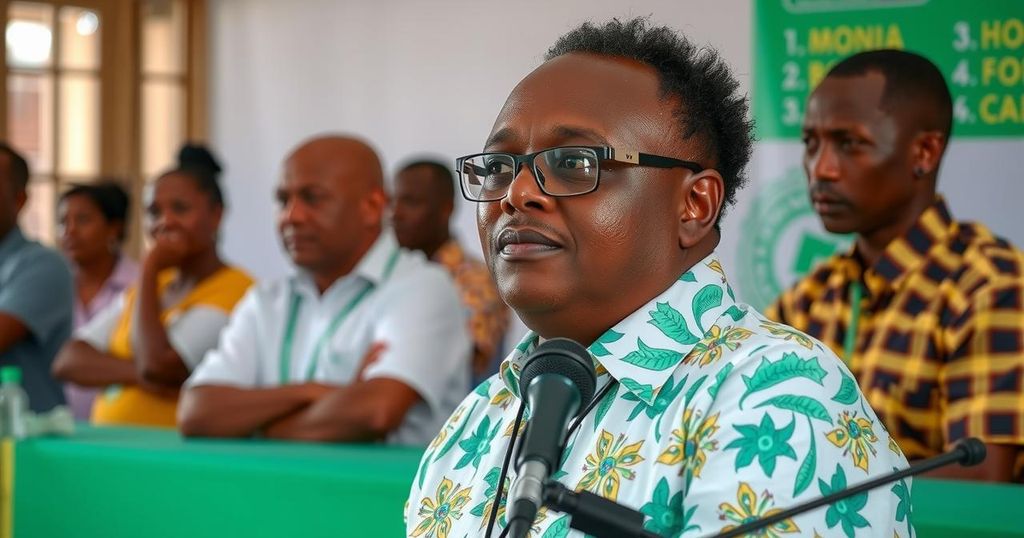World news
AFRICA, AKUFO - ADDO, BAWUMIA, DAKAR, ELECTION, GHANA, GOVERNANCE, GOVERNMENT, JOHN DRAMANI MAHAMA, MAHAMA, MAHAMUDU BAWUMIA, N. D. C, N. P. P, NANA AKUFO - ADDO, NATIONAL DEMOCRATIC CONGRESS, NEW PATRIOTIC PARTY, PRESIDENTIAL ELECTION 2024, SENEGAL, SUCCESSION PLANNING
Fatima Khan
0 Comments
Ghana’s Election: A Crucial Decision Amid Economic Turmoil
Ghana’s election on December 7 presents a choice between former president John Dramani Mahama and current vice president Mahamudu Bawumia as the nation contends with severe economic challenges including rising inflation and poverty. The youth vote is significant, with over 700,000 first-time voters registered. Polling data suggests Mahama holds an advantage, and a high turnout is expected as voters express their frustration with current conditions.
In the upcoming election on Saturday, Ghanaians face a pivotal decision: to re-elect former President John Dramani Mahama from the National Democratic Congress (NDC) or to support current Vice President Mahamudu Bawumia from the New Patriotic Party (NPP). The nation is grappling with significant economic challenges, including high inflation, increasing national debt, and rising poverty levels. Analysts indicate that both candidates offer similar platforms, with little ideological distinction between the NPP and the NDC, making this election a critical juncture for the future of Ghana’s economy.
Ghana’s economy has suffered notably, driven by governmental borrowing that led to a default on debt repayments. This situation has resulted in a surge of inflation and a sharp decline in living standards, with approximately 850,000 additional citizens falling into poverty since 2022. The devastating effects of illegal mining, locally referred to as ‘galamsey,’ have prompted widespread protests among the youth, highlighting environmental degradation and challenging governmental authority. With over 700,000 first-time voters registered, particularly from Generation Z, this demographic’s engagement is expected to significantly influence the outcome of the elections.
Ghana, known for its relative stability in a volatile region, holds elections that frequently draw international attention. The country has historically been a beacon of democracy, but recent challenges, including the economic crisis and environmental degradation, have raised concerns among voters. Meanwhile, security and stability remain vital considerations in this election. The expected voter turnout can surpass historical averages, with assessments indicating that former President Mahama may possess an edge in the polls.
Polls are set to open on December 7 at 5 p.m. and results are anticipated to start flowing in shortly after voting concludes. The official announcement of the winner is expected within two to three days post-election. Candidates must secure a majority to win, or a runoff will occur within 20 days if that is not achieved.
The political landscape of Ghana has been shaped by two principal parties since the re-establishment of multiparty democracy in 1992—the NPP and NDC. Both parties have alternated in power during this period, each holding governance for approximately sixteen years. The nation is currently experiencing severe economic downturns, with inflation on the rise, significant national debt, and poverty affecting millions. As Ghana stands as the leading gold producer in Africa, the economic turmoil reflects broader global trends affecting resource-rich nations. Youth discontent is at a peak, with environmental issues gaining prominence due to illegal mining practices. This election presents a unique opportunity for voters to voice their frustrations and seek sustainable solutions.
Ghana’s upcoming election on December 7 represents a significant opportunity for voters to reassess their leadership during an unprecedented economic crisis. With the former president Mahama potentially returning to power, or the vice president Bawumia stepping into the role, electorate expectations are high. The intersection of economic hardship and the voices of the youth, particularly amid environmental grievances, underscores the critical nature of this election. A high voter turnout is anticipated as Ghanaians grapple with pressing issues that will shape their nation’s future.
Original Source: www.nytimes.com




Post Comment